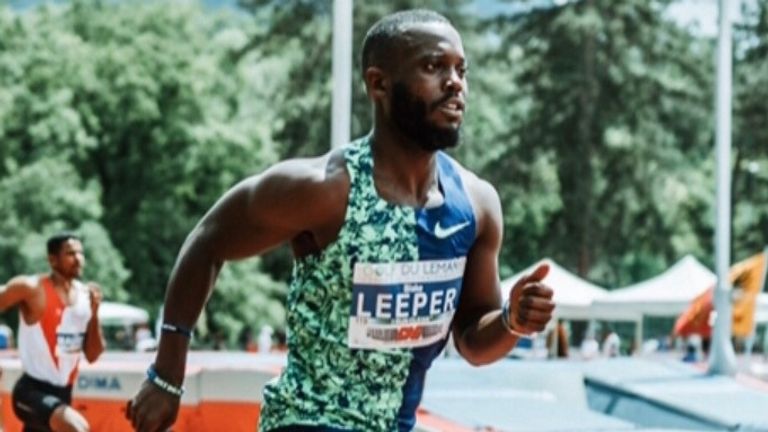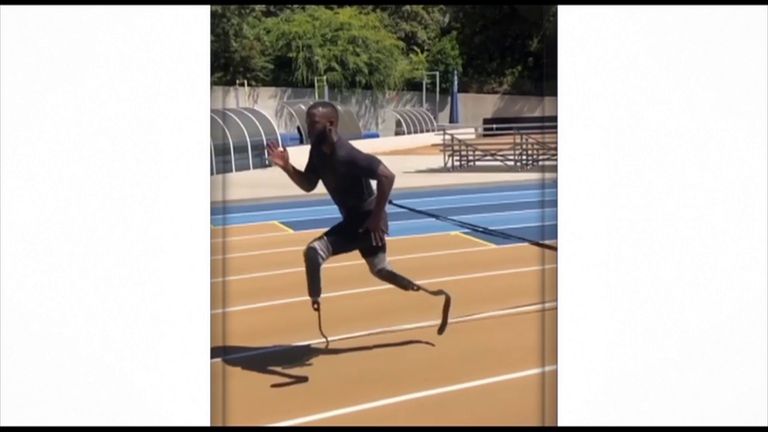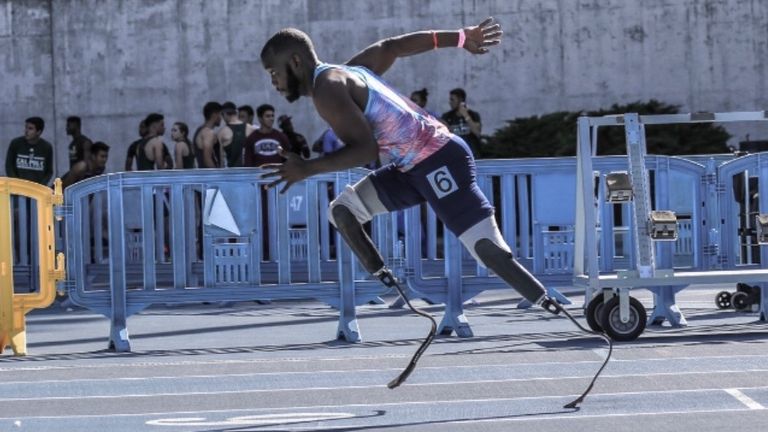Blake Leeper: Paralympian determined to overturn CAS verdict to compete at Olympics
Paralympian Blake Leeper lost his CAS appeal last month to use prosthetic running blades to try and qualify for Tokyo Olympics, reports SSN's Rebecca Williams; CAS claim blades allow him to run at a greater height than if he was running with biological legs
Thursday 12 November 2020 10:52, UK
Paralympic blade runner Blake Leeper insists the best example he can set to those with disabilities is by competing against able-bodied athletes at the Olympic Games
He won silver in the T43 400m and bronze in the 200m at the 2012 London Paralympic Games, behind Oscar Pistorius.
However, last month his Olympic dream faced a setback after the Court of Arbitration for Sport [CAS] ruled against him, claiming his blades allowed him to run at a greater height advantage than if he were running with biological legs.
Leeper was born with a congenital birth defect, meaning his lower legs did not develop properly. Scientists believe if he was born with both limbs he would be around 5ft 8ins tall, which Leeper disputes.
"I want to get this cleaned up. I want to get this looked at so hopefully the max allowed standing height can be overturned," he told Sky Sports News.
Trending
- Seven goals and 'keeper howlers! | Spurs edge Man Utd in CHAOTIC quarter-final
- Tottenham 4-3 Manchester United highlights
- Carabao Cup draw: Who will play who in the semi-finals?
- 'Actions speak louder than words' - Nev, Carra, Redknapp on Rashford situation
- Papers: EFL considering all options regarding potential VAR introduction
- Ange: Pros of playing out outweigh cons | Amorim defends Rashford call
- Man Utd latest - Amorim: We were the better team vs Tottenham
- World No 2 Smith stunned at World Champs
- PL Predictions: More dropped points for Arsenal at Palace?
- Chelsea latest: Palmer, Lavia, Fofana to play in CL knockouts?
"I want to have people look at this and say, 'this isn't right'. And hopefully I can run in both the Olympics and Paralympics next year. It would be so amazing. A statement from the committee, a statement from my life.
"The best example I can lead by is going into the Olympic Games, going there and competing, getting to the finals and getting a chance of potentially winning.
- CAS expects decision on Russia appeal by end of 2020
- Sky Scholars & YST celebrate sport changing lives
"When I get to that level, I am going to grab the microphone and do a calling card for all disabled people in the world. I am going to call them to stand up. If you can't stand up, wise up. If you can't wise up, roll up. Whatever you have to do, you get up and you keep fighting."
Leeper insists he will challenge what he describes as a "racist" decision, based on his estimated height, had he been born with both legs.
"I am so disappointed in the decision because it is on the basis that I gain an unfair advantage because I am too tall within my limits," Leeper said.
"These scientists, who have their own two legs, who have never worn prosthetic legs, who have never personally tested me, are saying 'If Blake had his legs, which I have never had, the tallest that he would ever possibly have been is 5ft 8ins'.
"My lawyers asked: 'Where are you getting your numbers from, who did you test? You didn't test Blake, so who did you test?' They said: 'We took a population of Caucasians and we tested them against a population of Asians and given he has a short torso, we presume he would have short legs'. They are comparing me to a race that my classification wasn't even in."
World Athletics "strongly rejects" the allegation of racism.
The organisation said: "IPC rule on Maximum Allowable Standing Height is based on the best available evidence of body dimensions and has been applied for several years to all Paralympic athletes without issue.
"World Athletics is aware of no proof that African-American athletes have significantly different bodily dimensions and certainly not to the extent identified in this case."
Leeper has had a difficult few years. He openly admits to having previously had a cocaine and alcohol addiction. He failed a drugs test in 2015, which meant he missed out on the Paralympic Games in Rio. The disappointment forced him to re-evaluate his life.
"I lost a lot," Leeper said. "People don't realise that one of my sponsors was my leg sponsors and once it went public they pulled their sponsorship from me.
"So by them pulling their sponsorship from me, they pulled my legs from me. So I lost my legs from the mistakes and the battles that I had.
"It was such a revelation for me and my life because once you hit rock bottom the only place you can go is back up and that's what I did. Once I lost my legs, my sponsorship, I embarrassed my family, I was a hometown hero. All that embarrassment I was feeling, I had to get back to the basics and rebuild my life."
While Leeper was born with his disability his father always told him that just because he looked different it should not define him as a person.
He describes how his life has always been a battle, a battle to learn to walk, to get out of bed and go to school, but his mindset has always got him through.
He will be appealing CAS's decision in the hope of becoming one of a small number of Paralympic athletes who have managed to compete in the Olympic Games.






